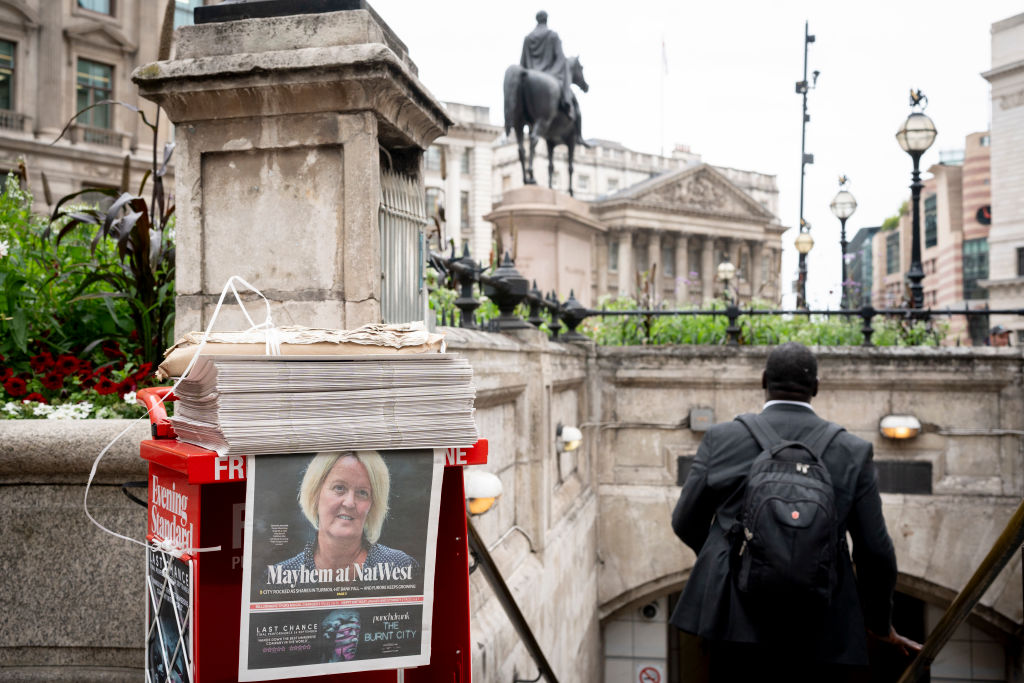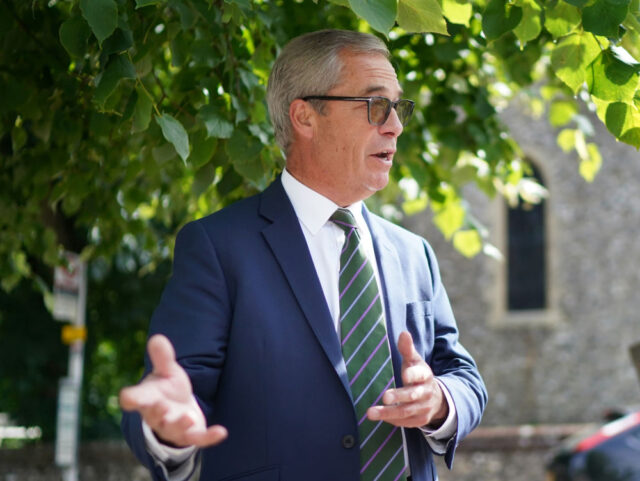Nigel Farage has said he will continue to act on behalf of the “tens of thousands” of people in the UK who have already been ‘debanked’, often over things as little as operating small businesses that take payments predominantly in cash, as he declares a war against the great-reset style cashless society.
The debanking of ‘Mr Brexit’ Nigel Farage has been front page news for over a month now — the story helped by Farage’s timing, first revealing the move against him in the summer recess where politicians are on holiday and newspapers desperate for page-filling content — and despite the notable development of the CEO of NatWest being forced out this week, he says there is much more to be done. One consistent element through the story’s evolution has been Mr Farage emphasising the considerable numbers of people who have contacted him since the debanking move broke revealing the same had happened to them, and he now says he’s “seriously motivated” to keep fighting for them.
Scalp! Bank Boss Resigns With Immediate Effect Over Leaking Nigel Farage’s Private Information to BBC https://t.co/vNav2sEQIa
— Breitbart London (@BreitbartLondon) July 26, 2023

Copies of the Evening Standard newspaper carrying the headline about the resignation of Natwest CEO Dame Alison Rose, are seen at Bank Station in the City of London, the capital’s financial district, on 26th July 2023, in London, England. Dame Alison Rose resigned in the early hours of this morning following her admission to being the source of an inaccurate BBC report about Nigel Farage’s account at Coutts Bank – part of NatWest Group and whose shares fell sharply as a result today. (Photo by Richard Baker / In Pictures via Getty Images)
Frequently talking of blue-collar, cash-in-hand jobs like window cleaners, Mr Farage claims there are “tens of thousands” of Britons who have had their bank accounts cancelled, often for things as small as accepting cash for payments. In other cases that have come to prominence in recent weeks, including “many” Members of Parliament and their families, including some very senior ministers being turned down for bank accounts because they are deemed to be “Politically Exposed Persons” (PEPs), as well as charities and organisations having their accounts closed because of their views.
Mr Farage said he wouldn’t be staging a political comeback over the issue, but would be a champion for ordinary people. He told radio today that: “I am now a champion and a crusader for men and women who have been closed down by the banks and I want cultural changes within the banks and I want legal changes and I do not want cash driven out of the system and us pushed towards central bank digital currencies.”
In an opinion piece for The Daily Telegraph, Farage said more of his “war on woke banks”, writing that:
I hope that this week marks a turning point. The City Minister, Andrew Griffith, has read the riot act to the 19 bank bosses who were summoned to the Treasury for a meeting. This is a good start. People’s lawfully held political and personal opinions should have nothing to do with their right to a bank account. Banks should not be and must never become political organisations… This point also marks the start of a much bigger campaign for me. As I have said before, the only reason I decided to go public – and ultimately cause myself quite a fair degree of embarrassment – is that I realised over the last couple of years that many people had wrongly had their bank account closed.
…A common feeling that has been expressed to me over these past few weeks is one of helplessness bordering on despair. It is clear that nobody has been speaking up for everyday people. Now, I intend to be their voice and to campaign for the cultural and legal changes that our banking system needs.
UK Government Looks Set to Take Action After Farage Debanking Saga: Report https://t.co/nxKw7wyUpY
— Breitbart London (@BreitbartLondon) July 20, 2023
Speaking to GBNews on Wednesday, Mr Farage said that banks were becoming political organisations, with customers who didn’t come up to the moral standards held by the bank’s executives face being “excluded”. He has warned in particular that banks are starting to monitor the social media use of their customers, which if not stopped suggests massive potential for harm in the future given the importance of having access to a bank account is to existing in an increasingly cashless society.
Even buying a train ticket, he observed, requires a bank card now as so few opportunities to pay with cash now exist, a situation which will be considerably exacerbated if plans to replace all ticket offices in the country with unmanned ticket machines proceed.
Mr Farage said:
…this campaign will not stop here. I’m not just doing this for me, I’m doing it for thousands — maybe tens of thousands of people — all over this country who have had their bank accounts over the past ten years.
… anybody involved in a cash business, NatWest no longer want their business. Let’s bear in mind we put £45 billion of taxpayer’s money into this bank to save it after its greed and stupidity was revealed in 2008. In return for that, they closed down most of the branches around the country, they don’t want to take cash from small businesses, they have closed the accounts of small businesses — tens of thousands — you can’t live and survive in the modern world without a bank account. You become a non-person.
Banking is now an essential service, just like water. And for [the now-resigned Natwest CEO] to say in this statement that they’re propud of the help they’ve given to families and businesses, it’s quite the reverse. The whole banking culture has gone rotten. We need big changes in the law, and ultimately where I want to get to with this campaign — and I’m not going to rest — I want to get to the point that we used to have where everybody in this country has a right to a bank account… that is my long-term aim.
Many of the issues at stake directly interface with the notion of a Great Reset-style cashless society, shepherded into existence with the assistance of controversial Central Bank Digital Currencies. As reported previously: “The Bank of England has also admitted that a digital pound could be “programmable“, meaning that the government could potentially add mechanisms to prevent people from spending their own money on things the state disapproves.”
Nigel Farage Debanked over Ties to Donald Trump and for Expressing Conservative Views, Bank Docs Show https://t.co/uSdvkT1uUV
— Breitbart London (@BreitbartLondon) July 19, 2023

COMMENTS
Please let us know if you're having issues with commenting.